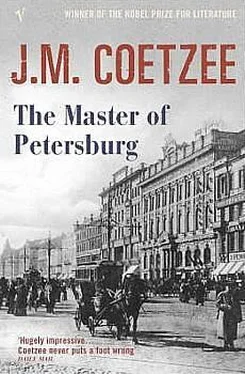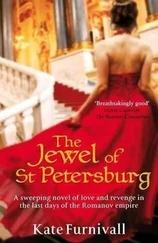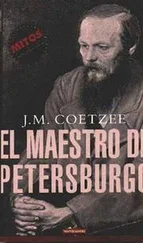He taps on the door at the other side of the staircase, pushes it open, and stands aside.
They are in a cellar room so low that he has to stoop, lit only by a small papered window at head-height. The floor is of bare stone; even as he stands he can feel the cold creeping through his boots. Pipes run along the angle of the floor. There is a smell of damp plaster, damp brick. Though it cannot be so, sheets of water seem to be descending the walls.
Across the far end of the cellar a rope has been spanned, over which hangs washing as damp and grey as the room itself. Under the clothesline is a bed, on which sit three children in identical postures, their backs to the wall, their knees drawn up to their chins, their arms clasped around their knees. Their feet are bare; they wear linen smocks. The eldest is a girl. Her hair is greasy and unkempt; mucus covers her upper lip, which she licks at languidly. Of the others, one is a mere toddler. There is no movement, no sound from any of them. Through rheumy, incurious eyes they gaze back at the intruders.
Nechaev lights a candle and sets it in a niche in the wall.
'This is where you live?'
'No. But that is not important.' He begins to pace back and forth. Again he has the impression of caged energy. He imagines Pavel side by side with him. Pavel was not driven like this. It is no longer so hard to see why Pavel accepted him as his leader.
'Let me tell you why I have brought you here, Fyodor Mikhailovich,' Nechaev begins. 'In the room next door we have a printing press – a hand press. Illegal, of course. The idiot who has the key is unfortunately out, though he promised to be here. I am offering you the use of this press before you leave Petersburg. Whatever you choose to say we can distribute in a matter of hours, in thousands of copies. At a time like this, when we are on the brink of great things, a contribution from you can have an enormous effect. Yours is a respected name, particularly among the students. If you are prepared to write, under your own name, the story of how your stepson lost his life, the students will be bound to come out in the streets in just outrage.' He ceases his pacing and faces him squarely. 'I am sorry Pavel Isaev is dead. He was a good comrade. But we cannot look only to the past. We must use his death to light a flame. He would agree with me. He would urge you to put your anger to good use.'
As he says these words, he seems to realize he has gone too far. Lamely he corrects himself. 'Your anger and your grief, I mean. So that he will not have died for nothing.'
Light a flame: it is too much! He turns to go. But Nechaev grips him, holds him back. 'You can't leave yet!' he says through gritted teeth. 'How can you abandon Russia and return to a contemptible bourgeois existence? How can you ignore a spectacle like this' – he waves a hand over the cellar – 'a spectacle that can be multiplied a thousandfold, a millionfold across this country? What has become of you? Is there no spark left in you? Don't you see what is before your eyes?'
He turns and looks across the damp cellar-room. What does he see? Three cold, famished children waiting for the angel of death. 'I see as well as you do,' he says. 'Better.'
'No! You think you see but you don't! Seeing is not just a matter of the eyes, it is a matter of correct understanding. All you see are the miserable material circumstances of this cellar, in which not even a rat or a cockroach should be condemned to live. You see the pathos of three starving children; if you wait, you will see their mother too, who to bring home a crust of bread has to sell herself on the streets. You see how the poorest of our black poor of Petersburg have to live. But that is not seeing, that is only detail! You fail to recognize the forces that determine the lives to which these people are condemned! Forces: that is what you are blind to!'
With a finger he traces a line from the floor at his feet (he bends to touch the floor; his fingertip comes away wet) out through the dim window into the heavens.
'The lines end here, but where do you think they begin? They begin in the ministries and the exchequers and the stock exchanges and the merchant banks. They begin in the chancelleries of Europe. The lines of force begin there and radiate out in every direction and end in cellars like this, in these poor underground lives. If you wrote that you would truly awaken the world. But of course' – he gives a bitter laugh – 'if you wrote that you would not be allowed to publish. They will let you write stories of the mute sufferings of the poor to your heart's content, and applaud you for them, but as for the real truth, they would never let you publish it! That is why I am offering you the press. Make a start! Tell them about your stepson and why he was sacrificed.'
Sacrificed. Perhaps his mind has been wandering, perhaps he is just tired, but he does not understand how or for whom Pavel was sacrificed. Nor is he moved by this vehemence about lines. And he is in no mood to be harangued. 'I see what I see,' he says coldly. 'I don't see any lines.'
'Then you might as well still be blindfolded! Must I give you a lesson? You are appalled by the hideous face of hunger and sickness and poverty. But hunger and sickness and poverty are not the enemy. They are only ways in which real forces manifest themselves in the world. Hunger is not a force – it is a medium, as water is a medium. The poor live in their hunger as fish live in water. The real forces have their origin in the centres of power, in the collusion of interests that takes place there. You told me you were frightened that your name might be on our lists. I assure you again, I swear to you, it is not. Our lists name only the spiders and bloodsuckers who sit at the centres of the webs. Once the spiders and their webs are destroyed, children like these will be freed. All over Russia children will be able to emerge from their cellars. There will be food and clothes and housing, proper housing, for everyone. And there will be work to do – so much work! The first work will be to raze the banks to the ground, and the stock exchanges, and the government ministries, raze them so thoroughly that they will never be rebuilt.'
The children, who at first had seemed to be listening, have lost interest. The smallest has slid sideways and fallen asleep in his sister's lap. The sister younger than Matryona, but also, it strikes him, duller, more acquiescent. Has she already begun to say yes to men?
Something about their silent watching seems odd too. Nechaev has not spoken to them since they arrived, or given any sign of so much as knowing their names. Specimens of urban poverty – are they more to him than that? Must I give you a lesson? He remembers Princess Obolenskaya's malicious remark: that young Nechaev had wanted to be a schoolmaster, but had failed the qualifying examinations, and had then turned to revolution in revenge against his examiners. Is Nechaev just another pedagogue at heart, like his mentor Jean-Jacques?
And the lines. He is still not sure what Nechaev means by lines. He does not need to be told that bankers hoard money, that covetousness makes the heart shrivel. But Nechaev is insisting on something else. What? Strings of numbers passing through the window-paper and striking these children in their empty bellies?
His head is spinning again. Give you a lesson. He draws a deep breath. 'Do you have five roubles?' he asks.
Nechaev feels distractedly in his pocket.
'This little girl' – he nods toward the child – 'If you were to give her a good wash and cut her hair and put a new dress on her, I could direct you to an establishment where tonight, this very night, she could earn you a hundred roubles on your five-rouble investment. And if you fed her properly and kept her clean and didn't overuse her or allow her to get sick, she could go on earning you five roubles a night for another five years at least. Easily.'
Читать дальше












